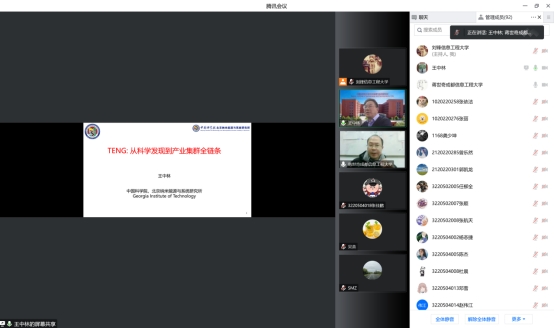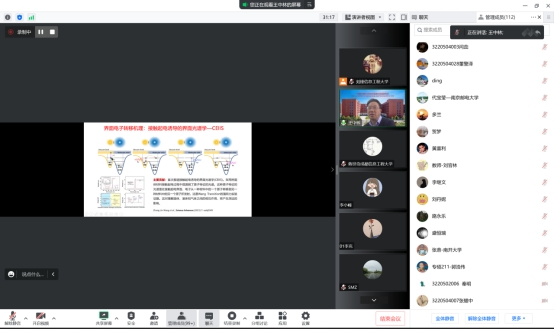At 2 p.m. on December 09, Prof. Wang Zhonglin, foreign academician of the Chinese Academy of Sciences, director of the Beijing Institute of Nanoenergy and Systems of the Chinese Academy of Sciences, dean of the School of Nanoscience and Technology of the University of the Chinese Academy of Sciences, and tenured director chair professor of the Georgia Institute of Technology, was invited to the series of academic reports of the International Joint Research Center of Robots and Intelligent Systems of Chengdu University of Information Technology through the live broadcast of the Tencent meeting, bringing an academic feast named "TENG: The Whole Chain from Scientific Discovery to Industrial Cluster" to more than 100 teachers and students in the live broadcast room. The lecture was chaired by Prof. Jiang Shiqi, Executive Director of the Center, and attracted many teachers and students from many universities.
At the beginning of the report, Prof. Jiang introduced the basic situation of Chengdu University of Information Technology to Prof. Wang, and expressed his heartfelt thanks to Prof. Wang for being invited to give academic lectures on behalf of the teachers and students of the university. At the lecture, Prof. Wang first asked the question "What is original research?" From steam engines to aero engines, from electromagnetic induction phenomena to the discovery of radio waves, teachers and students have triggered common deep thinking.Subsequently, Prof. Wang talked about the first invention of triboelectric nanogenerator (TENG) by his team in 2012. The principle of TENG is based on the displacement current generated by the relative movement of the medium to convert mechanical work into electrical work. In order to describe the development of these future sciences, Prof. Wang derived the kinetic Maxwell's equations in low-speed moving media, and theoretically expanded Maxwell's equations. TENG has a wide range of applications, which has led to industrial clusters, such as micro-nano energy, self-driving sensing, medical health, environmental protection and detection, wearable and flexible electronic devices, security technology, etc. The atmosphere of the on-site exchange and interaction session was relaxed and warm, and finally, Prof. Wang warmly called on the students: Follow us and join into the great, original, and future infinite application research field!
Prof. Wang's narration is extremely vivid and in-depth, and his spirit of perseverance, perseverance and innovation in scientific research is worth learning from every scholar. The teachers and students present felt greatly benefited and encouraged, and further broadened their academic horizons.


International Joint Research Center of Robots and Intelligent Systems
